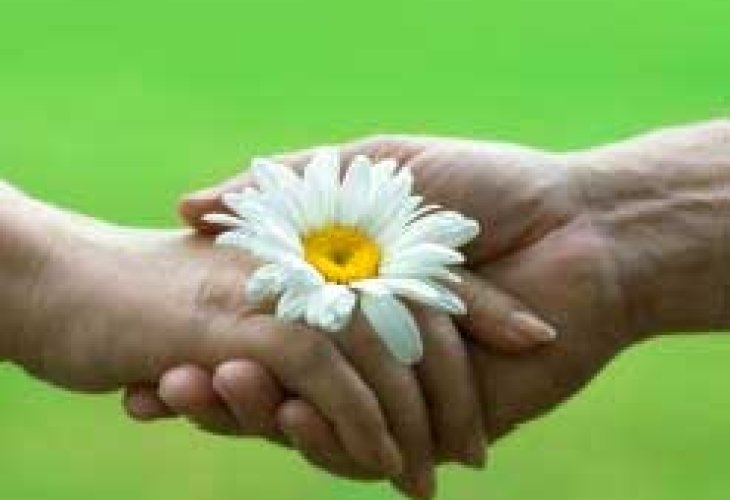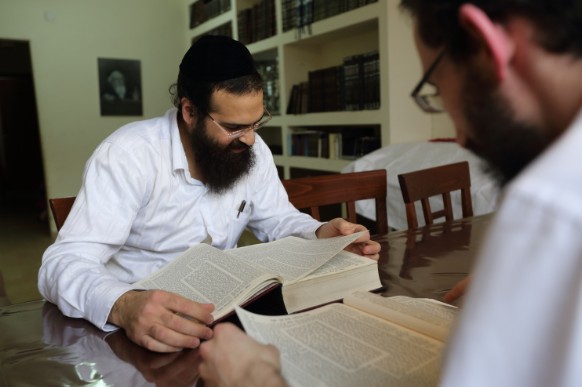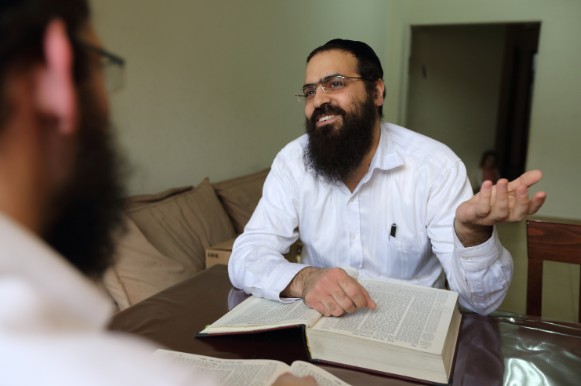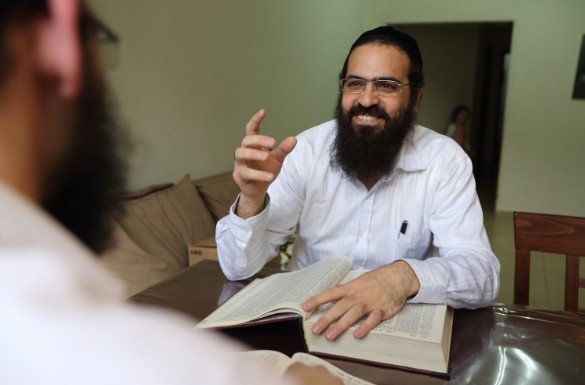Study in Chavruta - And Donated a Kidney Together
Uri Goldstein and Benaiah Kalimi study Torah in chavruta and save lives. Both donated a kidney and now see it as their mission to persuade as many people as possible to fulfill this mitzvah. "It's like giving a dollar so someone else can receive a hundred dollars."

For as long as Benaiah Kalimi can remember, he has been involved with the halachic issues related to organ donations. Why? He cannot explain it himself, but the topic interested him, and he often investigated it through the lens of halacha, pausing on questions and discussions on the subject.
"Unlike many others who are unaware of the option of kidney donation and do not know its meaning, I always knew what it entailed, and the subject was on my mind, albeit at a very low level," he says. "About four years ago, the wife of the head of the kollel where I studied urgently needed a kidney transplant. I witnessed the process from the moment her illness began to deteriorate. I saw the endless worry of the head of the kollel for his wife and how he constantly clung to the hope that the right person would be found to donate her an organ. Every phone call startled him, and many times it seemed salvation was coming, but at the last moment, everything fell through. One day, we received the good news that a donor had been found. We were fully involved in the anticipation for the surgery, which, thank God, succeeded, and today the woman is healthy and whole, standing on her feet and running a blessed home filled with children.
"Seeing all this up close made me feel that if such a great act of kindness could be done for another, it was impossible to stand by. I decided to look into it practically and see if it might be a fit for me."
No Disagreements
Kalimi's first stop was, of course, Rabbi Yeshayahu Haber. "I sat with him for long hours," he recalls. "Rabbi Haber demonstrated amazing knowledge of the medical material and could answer every question I had before I even voiced it. He also provided me with a 'mountain' of medical materials and the names of prominent professors with whom I could consult and learn about the significance of the donation and how it might affect my life.
 (Photo: Yaakov Nahumi)
(Photo: Yaakov Nahumi)"I left there," he continues, "and even on the same day I read all the materials from start to finish. I felt only when I fully understood the subject would I be at peace with myself. The more I read, the more relaxed I became. I saw that it was a subject without disagreements, and all doctors, without exception, unanimously believed that the second kidney in a person’s body is seemingly redundant, like a spare wheel in a car. To complete the picture, I also consulted with great Torah scholars. I personally visited the home of Rabbi Yitzchak Edelstein, the Rabbi of Ramat HaSharon, and he encouraged me greatly, saying that it is a significant mitzvah. I also spoke with Rabbi Aharon Leib Shteinman, who supported me and said that 'it is not obligatory, but a very great mitzvah.' The same was true when I approached Rabbi Ovadia Yosef, of blessed memory, who also blessed me wholeheartedly. In the end, I was filled with so much desire, and even my wife, who initially worried, gave her full consent. So, I set out on this path."
Were there moments when you were fearful nonetheless?
"Generally, I'm a lighthearted and easygoing person, not skeptical. Once I was convinced I wanted it, it was clear to me that I would see it through to the end. However, the doctors explained to me that I had every right to change my mind until the very last moment, and they assured me that even a minute before surgery, I could still back out without them telling the recipient that I had changed my mind; they would simply explain that, due to reasons related to them, the transplant couldn't be performed. They did everything to ensure I wasn't pressured, but that I made the donation with pure intentions and genuine desire."
Drunk with Happiness
After the decision, some time passed until the surgery, and during those days Kalimi recalls that the most special moment he remembers was when he went to register for the donation at the Ministry of Health, and with him were the recipient and his father. "The recipient was a 16-year-old yeshiva boy born with kidney failure. He suffered tremendously throughout his life, and this was already his second transplant. The father told me that four days a week he took his sick son to the hospital to connect him to dialysis for several hours. But about a month ago, they were told there was no chance that the boy could survive dialysis treatments for long as his weak body would not withstand it, so they needed to urgently find a kidney donor. Suddenly, I understood how much it was a matter of life and death and how my donation was truly a rescue," Kalimi explains.
A few months later, the transplant was performed at Beilinson Hospital. "I arrived at the hospital the night before the surgery," he recalls, "My feeling was very uplifting. No special tests were needed beyond the most basic ones, and then I fell into a sweet sleep until morning. I woke up early, prayed the sunrise prayers in the hospital synagogue, and in that prayer, I felt as if I was standing before the King of Kings Himself. By eight o'clock, I had already been led to the operating room, from which I emerged four hours later."
 (Photo: Yaakov Nahumi)
(Photo: Yaakov Nahumi)The next thing Kalimi remembers is waking up in the recovery room. "I woke up feeling very sublime. I was in a hazy state of consciousness and felt a bit like a drunk, more precisely - drunk with happiness. I was truly excited. I felt that I had done something so great in renewing another person's life. This feeling cannot be described in words."
And how was the recovery?
"Everything went very smoothly. True, there were some pains in the incision, but apart from that, within two weeks I completely returned to a normal and regular routine, like any other person."
Like any other person? Kalimi notes that for him, he has become a different person, given that since the donation, he feels that many things have changed for the better. "It truly feels like Hashem has drawn closer to me and 'the gates have opened," he testifies excitedly. "First, after five years of a pause, my wife was blessed to be expecting, and this was a great divine assistance because although we had children before, we very much wanted more. At the same time, we were also blessed to expand our home, our livelihood was more abundant, and during that period I was also appointed head of a kollel, which was a great spiritual achievement for me. We felt truly that Hashem was drawing closer to us and loves us.
"But beyond that," Kalimi emphasizes, "I can say, without exaggeration, that all the blessing we received pales compared to the great happiness I carry for four years, knowing there is someone in the world who lives because of me. It astonishes me to think that after years of treatment, the boy functions well without hospital visits, and also spiritually - every page of Gemara he learns, every mitzvah he fulfills, counts in my merit as well."
Have you met since?
"Yes, I first met him sometime after the donation when I happened to visit Jerusalem and came to see him at his home. He sat with his family, and I saw how much he had changed for the better – suddenly he began to eat and gain weight, grew a beard, and smiled at the world. Only then did I realize how much he had suffered before. Since then, we have met on several occasions. Every time, we embrace with excitement and truly feel like brothers – brothers in blood."
Chavruta in the Hospital
But for Benaiah Kalimi, the story did not end there, as about two years later, he began studying at the "Morasha and Da'at" kollel of Rabbi Meir Greenblat (funded by Dan Gartner), where he met his chavruta – Uri Goldstein, also a resident of Bnei Brak.
"A good bond formed between us, and we frequently spoke on a variety of topics," Kalimi recounts. "The moment came when I concluded that Uri was exactly the right person to be a donor, and it was worth suggesting it to him, and so I did."
"The truth is that when Benaiah suggested the idea to me, it didn’t sound strange or bizarre," Goldstein notes with a smile. "I have been thinking about the direction of kidney donation for several years, and in addition, I also have a personal connection to the subject, since my father underwent a liver transplant a few years ago, and we all accompanied him with anxious anticipation and with great tension. Yes, kidney transplantation is something else, but when you feel in your flesh how someone feels on the other side of the transplant map, you understand the infinite importance of this.
"Yes, I always knew I wanted to donate, but despite that, I postponed it from day to day, until I began studying with Benaiah and noticed that he was a person with immense joy in life. 'Do you know what moments bring me this joy?' he asked me, and told me that since he underwent the surgery where he donated a kidney, he simply feels a special uplifting spirit. 'Whenever I want to cheer myself up I remember this donation and draw strength,' he revealed to me. Around that time, through absolute coincidence, I heard about two people I knew who also wished to donate a kidney, but in their case, they couldn’t donate because ultimately, through the meticulous tests they underwent, it was discovered that some illness was lurking in their body. Only because of these tests, which allowed very early detection of the disease, were they able to treat it, and they completely recovered. This, for me, also exposed another side of the coin – the understanding that special divine assistance accompanies all those who wish to donate, and there is no way they come out harmed."
Then you decided to donate?
"Hold on, hold on," laughs Goldstein, "I am not the type to make decisions in a day, and I also tend to consult with rabbis about every detail in my life. When I realized this was serious, I began by first examining the matter from a Torah perspective. The more I read medical materials and on the other hand researched what is written in sacred texts and halacha, I concluded that it is not 'common danger,' meaning – the risks are not high enough to truly worry about, and even if in the end something happens, one cannot attribute it to someone who put himself in a place of danger. Subsequently, I approached Rabbi Chaim Kanievsky, and he told me that 'a mitzvah guardian will not know evil, and I will see that everything will go smoothly and I have no reason to worry.' I also sent a detailed letter to Rabbi Edelstein, formulating the questions that remained for me, including the loss of study days as part of the recovery, issues with guarding one's eyes while being in the hospital, and more. Rabbi Edelstein read the matters and responded to them one by one – answers that certainly spurred me on to the surgery.
 (Photo: Yaakov Nahumi)
(Photo: Yaakov Nahumi)"I informed Rabbi Haber of my intention, underwent the required tests, and eventually reached the ministry of health committee where I was surprised to find the boy slated for the transplant who arrived at just the same time as I (even though he was supposed to come after me, and actually – we weren't supposed to meet at all). We stopped and talked, he told me about himself, and we even learned a page of Gemara together. It turned out to be a "transparent" family (in Aryeh Deri’s words) of people with no ability to make a living and no one to care for them. The father there is also kidney-stricken, and the boy’s condition is deteriorating day by day. My heart went out to him, I embraced him, and felt a great privilege to help him."
The surgery in Goldstein’s case took place just a few weeks later on the 3rd of Cheshvan. "Benaiah, my chavruta, accompanied me every step of the way. At each stage I passed, he explained to me exactly what awaited me and what I should do, which greatly eased and helped. During the two days of recovery in the hospital, he also came to study with me in the ward, and both of us felt simply euphoric. However, I must note that I had a big surprise when my recovery was much shorter than Benaiah’s, and within two days, right as I was discharged from the hospital, I no longer felt any pain, just as Rabbi Chaim Kanievsky blessed me. Upon discharge, I was also informed that the kidney was apparently successfully accepted by the boy’s body, and that was a very special feeling. I remember that at that moment, my first reaction was: 'I wish I could also donate a second kidney.'"
And Goldstein emphasizes that since the donation, both he and Benaiah feel a shared bond, and they see it as their mission to encourage more young Torah scholars to take this easy and simple step and give the gift of life to someone who so desperately needs it. "Recently, I saw in the book 'Birkat Ha'aretz' by the Steipler of blessed memory on the Parashat Vayetze that he writes that 'About every person it is decreed how much suffering he will have to endure in life. Happy is he whose suffering comes through Torah and mitzvot', and in other words – a person cannot escape the amount of suffering decreed upon him, but if he has the opportunity to undergo those sufferings for such a great mitzvah, then I think it would really be a shame to miss out."
And as Kalimi adds: "It is a kind of thing that from afar seems like a high mountain, but when you approach it, you discover it is barely a low hill. It is something so small that is missing from you but gives the other person their entire life. It is truly like giving a dollar for the other to receive a hundred thousand dollars. Isn't it worth it?"

